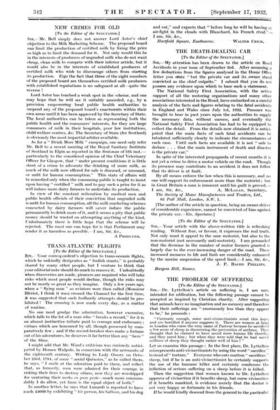TRANS-ATLANTIC FLIGHTS [To the Editor of the SPECTATOR.]
SIR,--Your correspondent's objection to trans-oceanic flights, which he unkindly designates as " foolish stunts," is probably shared by many other people, but I venture to think that your editorial note should do much to remove it. Undoubtedly when discoveries are made, pioneers are required who will take risks which most people would decline,. though .the risks may not be nearly so great as they imagine. Only a few years ago, when a " flying man " as aviators were then called (Monsieur Bleriot, I think it was) crossed the Channel for the first time, it was suggested that such foolhardy attempts should be pro- hibited The crossing is now made every day, as a matter of routine.
No one need grudge the admiration, however excessive, which falls to the lot of a man who " breaks a record," for it is an almost instinctive tribute paid to courage and enduranee ; virtues which are honoured by all, though possessed by com- paratively few ; and if the record-breaker does make a fortune out of his adventures, he deserves it far better than any "hero" of the films.
I might add that Mr. Ward's criticism was curiously antici- pated by Horace Walpole, in connexion with the aeronauts of the eighteenth century. Writing to Lady Ossory on Octo- ber 23rd, 1784, of some " aerial Quixotes," as he called them, he says, " I smile at the adoration paid to them, and reflect that, as formerly, men were admired for their courage in risking their lives to destroy others, now th:y arc worshipped for venturing their necks en pure perte—much more commen- dably I do allow, yet fame is the equal object of both."
In another letter, lie says that Lunar& is reported to have made £4000 by exhibiting " his person, his balloon, and hits dog and cat," and expects that " before long he will be having at air-fight in the clouds with Blanchard, his French rival.--
I am, Sir, &c.,
Hartfield Square, Eastbourne. WALTER CRICK.






























 Previous page
Previous page